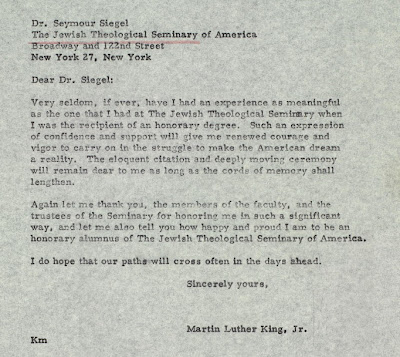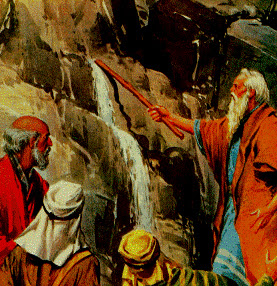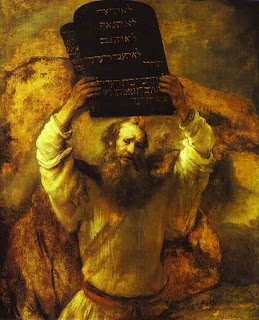Category: Moses
I still remember back in 1990 when Cecil Fielder (a Detroit Tigers All-Star 1st baseman like his son is today) was the favorite to win the All-Star Game Home Run Derby. Competing against the likes of Jose Canseco, Mark McGwire and Ken Griffey, Jr., Cecil failed to hit even one homer in the contest that night. This week, Prince Fielder became the first player ever to win the Home Run Derby in both leagues (he won in 2009 as a Milwaukee Brewer too).
There’s no question that Prince Fielder inherited the gift of hitting the long ball from his father. This week’s Torah Portion, Parshat Pinchas, is all about inheritance and succession. Moses was an impressive leader of the Jewish people in the desert as they made their journey to Israel. This week, however, we learn that Moses will not lead the Israelites into the Promised Land. Although he has worked tirelessly to be a great leader and inspirational figure, his career will end before the reward of entering the land with his people.
Cecil Fielder led the Detroit Tigers in the early 1990s, but didn’t succeed in taking his team all the way to the “Promised Land” of Major League Baseball — the World Series. Cecil Fielder’s numbers with the Tigers are impressive. On the last day of the Tigers’ season in 1990, Cecil hit his 50th and 51st home runs to become the 11th player in ML history to hit 50 homers in a season. But baseball is a team sport and while individual achievement is recorded into the annals of baseball history and celebrated, the ultimate reward is winning the World Series.
And that’s where inheritance and succession factor in. Moses wasn’t permitted the merit of taking his team, the Israelites, into the Promised Land. However, his inheritance was bequeathed to Joshua who would succeed Moses as the leader of the people. Joshua understood his role and he gave honor and respect to his predecessor. Without Moses there is no Joshua. That is how inheritance and succession work. Moses laid the groundwork and Joshua was able to complete the task.
I thought of the Moses-Joshua relationship and the Torah’s concept of inheritance and succession as I watched Prince Fielder hoist his Home Run Derby trophy high above his head. His sons flanked him on either side. His father was no where in sight. It is from his father that Prince has acquired the awesome ability to use a wooden bat and hit a small ball to distances surpassing 450 feet. Cecil wasn’t able to take his team into the Promised Land, but his progeny might be the leader to do it. Prince has that inheritance. He succeeds his father as the home run slugging first baseman who can lead his people to victory.
 |
| With Prince Fielder at the Ritz Carlton Hotel in Phoenix in 2007. |
Seeing Cecil Fielder proudly standing next to his son and two grandsons Tuesday night would have made that photo even better. But there’s a fractured relationship between the father and the son. No one knows for certain why Prince and Cecil don’t talk, but the dynamics of a father-son relationship can be complicated. Perhaps the complexities of the mother-daughter relationship are better documented, but they are no more challenging.
For Prince, it might have been difficult growing up as the son of the local baseball hero. For Cecil, it might be difficult watching his son succeed where he came up short in his own career. The strained relationship between Prince Fielder and his dad is rumored to be about money. After Cecil declared bankruptcy following a failed marriage, gambling debts, and poor real estate investment deals, there’s word that he took part of his son’s signing bonus with the Milwaukee Brewers. Whatever the case, life is too short to harp on such things. Reports indicate that Cecil might have taken $200,000 of his son’s $2.4 million signing bonus back in 2002. Prince Fielder’s current contract with the Detroit Tigers is for nine-years and a total of $214 million. That $200,000 a decade ago is meaningless today.
Earlier this year Cecil had some critical words to say about his son. “As a father, of course you’re proud of what your son’s been able to accomplish on the field, but as a father also you worry about how he is growing as a man, how — I want to say this correctly –how he is communicating with everybody that had something to do with how he got to where he is. And that part of my son, I think we’re all a little disappointed.”
After Prince signed with the Tigers this year, both Cecil and Prince have been quoted as saying the relationship has gotten a little better. And that’s good. As Mitch Albom wrote after Opening Day this past April:
Cecil Fielder always will be a part of Detroit sports history, just as his son now will make his own name in it. It does seem sad that the father watched the game alone in Atlanta, while the son played in Detroit. But that is between them. “I’ll get up there to see a game,” Cecil said before hanging up. “It’ll all work out. Just needs time.”
Indeed, it is between them. The father and the son. The succession of leadership and the inheritance of that big swing. I remain hopeful that both men will let bygones be bygones and move forward. Cecil’s pride should come from watching his son do what he was not able to in a Tigers’ uniform. And Prince’s respect and admiration for his father should come from an appreciation for the legacy that Cecil left as a Detroit Tiger and for the talent his father has bequeathed to him as his inheritance.
At the end of a McDonald’s commercial (below) featuring Cecil and Prince Fielder that aired in Detroit back in the 1990s, Prince looks up at his dad and apologizes for striking him out. Cecil looks down at his son with pride and says, “Oh, that’s okay son.” Maybe the two men will exchange similar words in the near future. So, while I wish Cecil was part of that awesome photo op on Tuesday night at the Home Run Derby, I’m willing to hold out to see the father celebrate with his son at a future trophy presentation. They deserve each other.
To produce water for the people the Lord commands Moses and his brother Aaron to assemble the community and order a rock to yield its water for the Israelites to drink. Rather than obeying God’s order verbatim, Moses takes his rod and strikes the rock twice producing drinking water. Immediately, Moses is condemned by God to die in the wilderness rather than being allowed to marshal his troops all the way to the Promised Land “because you did not trust Me enough to affirm My sanctity in the sight of the Israelite people.”
This certainly seems a harsh punishment for Moses’s actions, but upon deeper examination there is much to learn from both the mistake and the punishment. Rashi comments that the double striking of the rock was unnecessary and proved insulting to the sanctity of God by diminishing the greatness of the miracle. A midrash explains that the sin of Moses was not merely the physical act of striking the rock, but also that he lost control of his temper during Israel’s rebellion. The commentaries of Maimonides and Samson Raphael Hirsch concur that the severe punishment was for losing patience with the Israelites and striking the rock twice in frustration. In the Talmud we find the lesson that “When a prophet (like Moses) loses his temper, his gift of prophecy abandons him.”
Several excuses can be made in defense of Moses’ action. Clearly the leadership of such a complaining nation in the hot desert grew taxing on Moses, raising his stress level and making it more difficult to reason with the Israelites. Further, he did have the best interest of the people in mind when answering their call for more drinking water. However, he allowed his emotions to get the better of him and resorted to hitting rather than speaking. While Moses hit an inanimate object rather than speaking to it, his action should alert us to a serious problem today.
Domestic violence occurs in Jewish families at about the same rate of 15% as in the general community. However, studies demonstrate that Jewish women tend to stay in abusive relationships two or three times longer than those in the general population. The misnomer that domestic abuse is not a Jewish concern further exacerbates the problem by discouraging abused women from reporting the abuse to others.
Rather than speaking to each other about difficult issues within the relationship, many partners (mostly men according to statistics) resort to violence. Oftentimes, men blame their abusive actions on stress from work and they allow their emotions to impair their better judgment. Regardless of how demanding one’s life may seem with weighty responsibilities at home and at work, resorting to abuse is never acceptable. The lesson of Moses aptly demonstrates this for us. His punishment was indeed severe, but so is the message it sends to our community. It is always better to use words than to hit.
For more information on domestic abuse in the Jewish community, visit www.jcada.org.
“The broken tablets were put with the new ones into the Ark.” –Talmud, Menachot 99a
What can we learn from the fact that Moses put the broken tablets into the Ark along with the new tablets? We move on from our mistakes, but we also take the lessons along with us.
In helping to form a new nation, Moses made many mistakes. He overreacted when he saw the people sinning before God by dancing around the Golden Calf, and he threw the tablets to the ground. Forty days of hard work were lost.
As a leader, Moses owned his inability to handle the situation calmly. He did a “do-over” and received new commandments, but the experience of breaking the tablets wouldn’t be erased from memory. It was part of his narrative as a leader and part of the historical record of the Israelites. The broken tablets would endure alongside the new ones.
We all make mistakes on the way toward our goal. As a business owner and entrepreneur, there is a story upon which I often reflect that was shared with me by Josh Linkner. Everyone is familiar with WD-40, the water-displacing spray that was originally designed to repel water and prevent corrosion, but was later found to have numerous household uses. Many people, however, don’t realize that WD-40 stands for “water displacement 40th attempt.” It was the inventor’s 40th attempt at a successful product. Norm Larsen had 39 do-overs before finding success. By naming his product WD-40 he kept the first 39 attempts with him as a lesson, just as Moses preserved the broken tablets as a reminder.
May we all make mistakes and then remember those mistakes as lessons as we achieve our goals.
This is a reflection on the fourth day of the Omer. Join the conversation by visiting the Omer liveblog on HuffPost Religion, which features blogs, prayers, art and reflections for all 49 days of spiritual reflection between Passover and Shavuot.
This is not the first time that Moses appeals to God using his speech impediment as an excuse. In last week’s parsha, Moses claims Lo ish d’varim anokhi – “Please, O Lord, I have never been a man of words, either in times past or now that You have spoken to Your servant.” Ki khvad peh u’khvad lashon anokhi – “I am slow of speech and slow of tongue.”
God negotiates with Moses finally offering his brother Aaron as Moses’ mouthpiece to convey the message to the people. Yet Moses remains the central guiding figure standing at the helm of the Israelite nation. One not familiar with the rest of the Biblical Narrative might presume that Moses’ incompetence in public speaking would immediately disqualify him for the role of leader of the Israelites. Thus, regardless of how we understand Moses’ speech impediment or its negative effect on his self-confidence, we should consider the fact that the Jewish people’s leader par excellence was not an effective speaker. And it did not matter.
Moses says, “I am not a man of words.” So, how is he such a successful leader? He is a man of action. Moses says, “I am slow of speech.” What does he mean by this? He is a man of justice. He might have physical disabilities or limitations precluding him from eloquently conveying a message, but it does not deter him from demonstrating strong and charismatic leadership abilities in other ways. What Moses lacks in oratorical skill, he makes up for in his action, and in his pursuit of justice.
This past week our nation commemorated the life of Dr. Martin Luther King, Jr. on the anniversary of his birthday. Dr. King was one of humanity’s greatest orators. He could steer an audience’s emotions with his booming voice, with his carefully crafted words, with his memorable sound bites. And yet, it was his acts of social justice that ultimately made him the great leader that he was. Many of us have seen the famous photographs of Dr. King walking arm-in-arm with Rabbi Abraham Joshua Heschel at the march in Selma Alabama. Heschel famously commented that on that day, he was “praying with his feet.”
 |
| Letter from Dr. Martin Luther King, Jr. to Rabbi Seymour Siegel thanking him for his honorary degree from the Jewish Theological Seminary on July 3, 1968 |
Equally moving was the time King and Heschel, two modern masters of words, walked together in silence to Arlington’s Tomb of the Unknown Soldier in protest of the war in Vietnam. They laid a wreath in pledge to lo yilmedu od milchama – that humankind would “no longer know war.” They certainly could have movingly expressed their feelings with words, but it was more powerful to resort to action. They let their actions do the speaking.
We should be curious as to why God does not perform a miracle and correct Moses’ speech impediment. After all, this is a God who only moments later causes miraculous plagues to triumph the Egyptians and opens the sea for our ancestors to cross. The answer must be that actions speak louder than words. Moses leads by example. He leads by doing.
This should become a powerful message of American Judaism. We have the moral imperative to strengthen our social action initiatives. We must apply Jewish ethics to contemporary issues pursuing social justice. From the words in our Tradition, tzedek tzedek tirdof (only justice shall you pursue), we must make it our ethical responsibility to make social action one of our highest priorities. Rabbi Shammai teaches in Pirkei Avot, “Say Little Do Much.” Not everyone is a great speaker. But that should not be a hindrance. Be a “doer.” You can change the world.





